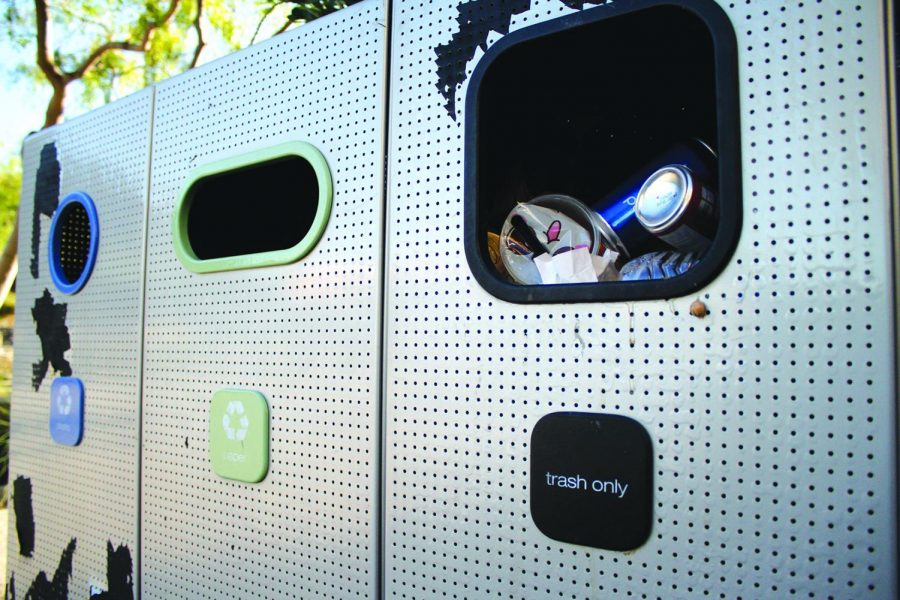Throughout the UTEP campus, students can find receptacles labeled aluminum cans, plastic bottles, trash, and paper – but what exactly happens to recycling after it gets put in these bins? The process is grueling and even costly, however it is something that UTEP has been doing for decades.
According to the UTEP facilities waste management webpage and their section on waste management, UTEP began its recycling program in 1998. The website also states that UTEP currently collects and processes 40,000 pounds of paper products monthly.
“Once it’s collected, we have a special dumpster that a recycling company comes out and picks up,” said Louie Morales, the associate director of Facilities Services. “They actually charge us to take it away because our consumption of plastics and paper isn’t enough to be profitable.”
UTEP pays the cost of recycling and students have supported this initiative with other projects. This can be seen with the creation of the Green Fund in 2011. It was voted on by the student body and approved a $3 increase as a sustainability fee to students’ tuition.
The Green Fund raises $200,000 annually for campus sustainability projects. It also funds marketing and outreach to expand the exposure of Green Fund projects and initiatives.
However, the Green Fund does not cover the cost of recycling; that is paid for by the university itself and additional costs are added in the form of sorting fees. This happens when non-recyclable materials contaminate these receptacles.
“It’s a cultural thing,” said Morales. “We just can’t get UTEP on board because we don’t have the champions in the student body or faculty to say, ‘hey, let’s do it this way,’ because if we say it, it isn’t enough.”
UTEP’s Faculty Senate nominated Sabhia Khan, Ph.D., associate professor of communication, as a representative of the Green Fund. However, the Faculty Senate does not have a representative that focuses on environmental issues.
“I think we have a lot of faculty who care about the environment,” said Guillermina Gina Núñez-Mchiri, Ph.D., president of the Faculty Senate. “I think it’s inviting people to a dialogue to say we need to improve our recycling efforts and what can we do to work on them.”
Although the Faculty Senate does not have a representative that focuses on environmentalism, they do create committees based on the concerns that students and faculty have.
“As faculty or students bring up an issue or concern, we assign the task to a committee to work on it,” said Núñez-Mchiri.“If we don’t have a committee, we will create ad hoc committees to advise the faculty senate and make recommendations… I think if students consider this to be a priority that they need to bring this up to student government.”
According to the UTEP waste management page, recycling is collected on a building-by-building schedule, with recycling bins placed next to trash cans around campus it makes it convenient for students to recycle.
“I see that they have the recycle bins normally placed with trash cans and I think that’s a really good effort, but I don’t know, I haven’t really paid much attention to it,” said Mia Solis, a senior at UTEP.
This August, the Green Fund spent $5,000 on marketing supplies and outreach to expand their visibility. The Green Fund also spent $9,160 on marketing students to produce marketing materials and for outreach efforts.
From January to August of this year, the Green Fund has spent 78% of its annual budget and so far, none of it has been spent on recycling. Some of the projects that it has done this year include changing the landscape equipment from gas-powered to electric-powered.
Although the Green Fund does not contribute funds to help with the cost of recycling on campus, most of its funds go to sustainability projects such as the Green Roof expansion and revitalization. This project expanded the availability of native plants and revitalized UTEP’s Green Roof.
UTEP is doing its best to provide students with opportunities to recycle their waste by covering the cost, though it is ultimately up to the students to be stewards of their own environments. Students can do this by making sure their recyclable materials are going into the correct bins and fostering a culture of sustainability.
Student Government Association could not be reached for a comment.
The Green Fund is open to the submission of “Green Ideas” and proposals. They can be accessed at www.utep.edu/student-affairs/greenfund/.
Levi Carlos is a staff reporter and can be reached at [email protected]












